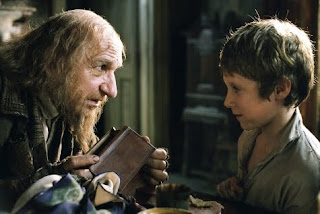Saturday, September 22, 2012
Oliver Twist, Mr Bumble, You Named Him So Yourself!
Oliver Twist starts with a macabre sort of humour before it descends into pathos. Dickens affects to be amused by all those cruel wo/men who mistreat Oliver, starve him, beat him and finally, force him to runaway through their combined cruelty.
Reading this, I realised that the musical was pretty far off and it skated over some of the more difficult/painful events. Artful Dodger wasn't cute. He was vile (though funny). Oliver didn't take to him. And Fagin was utterly disgusting. However, not in keeping with what later became his usual practice, Dickens lets us know that he's going to be hanged (and how) but doesn't let us peep in at the hanging.
Bill Sikes, well, he accidentally hanged himself, didn't he? And still, considering his crimes and his cruelty, his death didn't seem retribution enough. The murder of Nancy was a thing of nightmares. But perhaps, considering that she remained loyal to him till the end and wouldn't leave him, although she was offered a chance of escape and a better life, perhaps death was best. But what a death. The only good thing I could see in it was that it unstoppered a dam, and justice long delayed, finally flowed on the heads of all those disgusting creatures. Dickens didn't treat them with a light hand, especially Fagin, whom he simply designated as "the Jew". I would have considered him anti-Semitic, except for his depiction of a very different Jew in Our Mutual Friend, who was friend of one of the heroines, Lizzie Hexam.
Oliver himself played a very active role in the first half of the book. How he is born, mistreated from birth, almost, how he runs away, how he falls in with Fagin and the boys, how he is rescued the first time by the "benevolent gentleman", Mr Brownlow, how he is kidnapped again by Fagin's boys (through the good or rather bad offices of Nancy), how he is used for a robbery, and then rescued again, this time by the benevolent Mrs Maylie and the beautiful Rose Maylie (who was a piece with all Dickens's heroines except that there seems to have been a cloud over her parentage), and then he fades out of the picture and we see the adults fighting among themselves - to establish his identity.
By a series of coincidences that could only happen in a Dickens (or Wilkie Collins) novel, his first rescuer is his father's best friend, and his second, his own aunt.
Mr Bumble was meant to be a comic character. The funny thing is he decides to get married, thinking this widow is comfortably provided for, and she turns out to be a she-devil who controls him effectively. She's the stronger of the two...and the eviller...and finally they separate as paupers.
Sometimes I wonder at his use of humour...but I guess he does it to underline something particularly horrific and ridiculous (as in the Poor Laws and the treatment of paupers or orphans).
However, I've started on Mudfog and I find the writing of extremely crude. When he tried to pass off the dissection of that pug dog as humorous...I had to stop reading. But who knows, maybe it improves. The one good thing about Mudfog is that it's pretty short.
I thought I had only one or two novels left when I checked, it was more like 10. Never mind. For the most part, the novels are extremely enjoyable. (Mudfog notwithstanding). I like the fact that he puts some mystery in the midst of most of his novels, and the unraveling of said mystery provides some of the narrative drive.
But the writing itself, the descriptions, the humour, that's what keeps you turning the pages.
In this book, like in most his books, Dickens sometimes emerges, and addresses the reader as the author, breaking the flow...this time, he came on to explain how he alternates tragedy with the ridiculous, to break the tension...and he kindly tells us that to be able to do it effectively takes genius. Oh well done, Chuckie boy, now we know.
Subscribe to:
Post Comments (Atom)

No comments:
Post a Comment